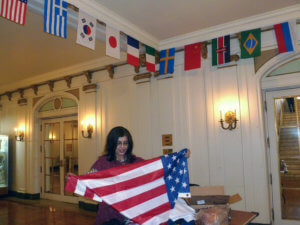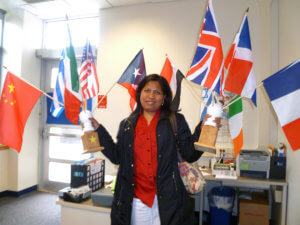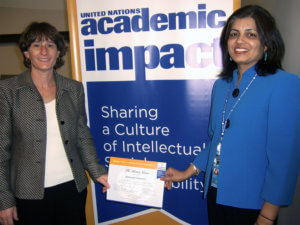A Brief History of the IGU
The Institute for Global Understanding (IGU) is a part of Monmouth University’s legacy of devoted engagement to its communities, both local and global. In its various forms over the last two decades, the IGU expanded the reach of both faculty and students in their study of global issues, established connections with eminent public leaders and scholars, and enhanced cross-cultural awareness in its constituencies. Under the leadership of its new director, Professor Randall Abate, and with valuable input and support from a new IGU Faculty Advisory Council, the 2020-2021 academic year marks the beginning of a new era of the IGU in which it seeks to build on the strengths of its past achievements and move in exciting new directions to raise the academic profile of the Institute on campus and throughout the world.
Initially conceived as the Global Understanding Project (GUP), the IGU is the product of faculty and administrators’ deliberations in summer 2001 to address the importance of global engagement and the methods to promote a global focus at Monmouth. Grassroots efforts to establish an interdisciplinary program that reflected the participants’ areas of study, which included subjects as diverse as history, art and design, gender studies, criminal justice, and communication, were integral to the resulting project. Drs. Rekha Datta, Nancy Mezey, and Karen Schmelzkopf, along with then-Provost Thomas S. Pearson, were key collaborators in the early discussions. The terrorist attacks of September 11, 2001 reinforced the urgent need for global learning and work. As initially conceived, the IGU’s mission was to equip students “to realize their potential as leaders and to become engaged citizens in a diverse and increasingly interdependent world.”
 From its inception, the IGU prioritized promoting awareness of global perspectives among students, faculty, and staff. Under Dr. Datta’s leadership as the founding director, the IGU effectively demonstrated its commitment to encouraging recognition and discussion of pressing global issues. The annual flagship event, the Global Understanding Convention (GUC), showcased this commitment. Inaugurated in spring 2002, the week-long convention involved student, faculty, and public participation with open classrooms to facilitate free and open exploration and analysis of matters relevant to the IGU’s mission. Public speakers ranging from UN representatives to national leaders shared their insights relevant to each year’s theme.
From its inception, the IGU prioritized promoting awareness of global perspectives among students, faculty, and staff. Under Dr. Datta’s leadership as the founding director, the IGU effectively demonstrated its commitment to encouraging recognition and discussion of pressing global issues. The annual flagship event, the Global Understanding Convention (GUC), showcased this commitment. Inaugurated in spring 2002, the week-long convention involved student, faculty, and public participation with open classrooms to facilitate free and open exploration and analysis of matters relevant to the IGU’s mission. Public speakers ranging from UN representatives to national leaders shared their insights relevant to each year’s theme.
 The broad themes encouraged creativity and individual expression on behalf of all of the events’ participants, including the students who contributed projects with faculty from most academic departments. Students designed promotional materials and literature in Professor Patricia Cresson’s art and design courses. Three other faculty – Professors Jing Zhou, Michael Richison, and Karen Bright – also contributed every year by involving students to design posters and organizing a competition for best poster that would then be showcased in the following year’s GUC materials. Students also served as global ambassadors to guide attendees and engaged in conversations with both speakers and guests. The Global Matters newsletter, launched in 2007, highlighted the GUC’s speakers and student presentations, eventually developing into a medium to celebrate students’ and faculty’s achievements in advancing global understanding. Professors Heide Estes, Eleanor Swanson, Abha Sood, and Saliba Sarsar edited the Global Matters newsletter.
The broad themes encouraged creativity and individual expression on behalf of all of the events’ participants, including the students who contributed projects with faculty from most academic departments. Students designed promotional materials and literature in Professor Patricia Cresson’s art and design courses. Three other faculty – Professors Jing Zhou, Michael Richison, and Karen Bright – also contributed every year by involving students to design posters and organizing a competition for best poster that would then be showcased in the following year’s GUC materials. Students also served as global ambassadors to guide attendees and engaged in conversations with both speakers and guests. The Global Matters newsletter, launched in 2007, highlighted the GUC’s speakers and student presentations, eventually developing into a medium to celebrate students’ and faculty’s achievements in advancing global understanding. Professors Heide Estes, Eleanor Swanson, Abha Sood, and Saliba Sarsar edited the Global Matters newsletter.
 Building on the IGU’s early success and bolstered by a revised Strategic Plan that envisioned a center dedicated to formal treatment of global subjects, the IGU was elevated to the status of an institute at Monmouth in 2008. Provost Pearson founded the Provost Film Series, now the World Cinema Series, which showcased international films and fostered public discussions on the films’ portrayal of global issues. Dr. Datta led the organization of campus- wide events and developed community outreach projects that cemented Monmouth University’s status as a leader in global affairs among New Jersey institutions of higher education.
Building on the IGU’s early success and bolstered by a revised Strategic Plan that envisioned a center dedicated to formal treatment of global subjects, the IGU was elevated to the status of an institute at Monmouth in 2008. Provost Pearson founded the Provost Film Series, now the World Cinema Series, which showcased international films and fostered public discussions on the films’ portrayal of global issues. Dr. Datta led the organization of campus- wide events and developed community outreach projects that cemented Monmouth University’s status as a leader in global affairs among New Jersey institutions of higher education.
One such global-local community partnership endeavor was a collaboration among Big Brothers Big Sisters of Monmouth and Middlesex Counties, Asbury Park High School, and Monmouth University (“Project BAM”), which formed in 2008. Project BAM provided at-risk high school students with tutors and mentors and elevated Monmouth students’ involvement to advance the United Nations’ charge of instituting global interests in local communities by combining social justice and education. The participants addressed a range of global topics and introduced high school students to a university campus within a friendly and supportive environment that encouraged global citizenship, beginning with community connections. The project expanded into both Spain and Argentina and recruited study abroad students to serve as both mentors and English tutors to refugee students in secondary schools. The highly successful MU Debate Hawks mentorship program with Asbury Park High School, now in its tenth year, originated from one of the mentoring sessions of Project BAM.
 Dr. Datta also established valuable and enduring programs with the United Nations during her tenure as director, securing partnerships with United Nations Academic Impact (UNAI) and the United Nations Department of Public Information (UNDPI). The UNDPI membership authorized participation from 4 Monmouth faculty members and 2 students (1 undergraduate and 1 graduate). Participants in this program were able to secure UN ground passes and access to high-level UN meetings and conferences. Dr. Datta was invited to present at many UN conferences on global higher education, gender and development, gender-based violence, and other topics of global importance. At many of these conferences, Monmouth students also participated as panelists.
Dr. Datta also established valuable and enduring programs with the United Nations during her tenure as director, securing partnerships with United Nations Academic Impact (UNAI) and the United Nations Department of Public Information (UNDPI). The UNDPI membership authorized participation from 4 Monmouth faculty members and 2 students (1 undergraduate and 1 graduate). Participants in this program were able to secure UN ground passes and access to high-level UN meetings and conferences. Dr. Datta was invited to present at many UN conferences on global higher education, gender and development, gender-based violence, and other topics of global importance. At many of these conferences, Monmouth students also participated as panelists.
After a decade as Director, Dr. Datta stepped down in 2011 and Dr. Nancy Mezey, the founding Associate Director, assumed the vacancy. Dr. Mezey strengthened the IGU’s relationships with the United Nations by establishing the IGU’s status as a non-governmental organization within UNAI. Under Dr. Mezey, the IGU founded a UNAI internship program and established the UNAI Lecture Series, the first of its kind for any university. During this period, Monmouth’s students and faculty frequently visited the UN Headquarters and participated in UNDPI briefings.
The IGU also was critical in organizing Monmouth’s growing success in securing Fulbright awards. Several students and faculty applied for and participated in the Fulbright Scholar programs to fully engage in intercultural study. Even after the IGU’s brief hiatus in the mid-2010s, Monmouth continued its participation in Fulbright programs with the support of the strong network of faculty who had previously engaged in the programs. Monmouth’s recent recipients include Dr. Priscilla C. Gac-Artigas from the Department of World Languages and Cultures for the 2014-2015 Academic Year, Dr. Mihaela Moscaliuc from the Department of English for 2014-2015, Dr. Datta from the Department of Political Science and Sociology for 2017-2018, Dr. Michael Cronin from the School of Social Work for 2019-2020, and Dr. Mary Kate Azcuy during Spring 2020. Visiting Fulbright faculty also incorporated their previous studies and expertise into their work at Monmouth while instructing students, delivering lectures, and developing curricula. These scholars shared the outcomes of their engagement at Monmouth with their home institutions, expanding Monmouth’s global reach as far as Bosnia, Bangladesh, Israel, and Palestine.
The work of the GUP and the IGU was greatly facilitated by Associate Vice President Saliba Sarsar and his staff, first in the Office of Academic Program Initiatives and then in the Office of Global Initiatives. They provided crucial administrative and financial support to IGU’s multiple programs. Dr. Sarsar, who had oversight of the GUP and the IGU, played leading and sustaining roles, especially during transitions in the life of the Institute. Among these were coordinating the Provost Film Series, running BAM, editing the Global Matters newsletter, curating several cultural exhibits, securing two Fulbright grants, and guiding the GUC. Dr. Sarsar also served as Acting Director of the IGU from 2013-2015.
Overall, the IGU leadership and participants fostered an environment in which global learning and participation were, according to Provost Pearson, “woven into the fabric of the university’s culture.” One of the many ways that this legacy of success endures on campus is that the IGU was successful in integrating global understanding as a learning outcome in MU’s General Education program. This widely shared embrace of the value of globalizing education at Monmouth prompted faculty and administrators to request a relaunch of the IGU’s operations after a brief hiatus from 2015 to 2018. Professor Abate was selected to assume the role of IGU Director on March 1, 2020, and has been charged with reinvigorating the most effective and valuable IGU programs, among them a biennial IGU symposium, the Fulbright programs, relationships with the United Nations, and global-local community partnerships. With ongoing discussions among the individuals most instrumental to the IGU’s founding, and improved promotional efforts to solicit a wider base of support across the institution, Professor Abate plans to reclaim the IGU’s place at Monmouth and in the surrounding communities. New initiatives to be identified in a strategic plan for the IGU in the 2020-2021 Academic Year will facilitate strong connections across academic departments and institutes on campus and partnerships with other academic institutions and nongovernmental organizations across the globe. As the IGU reemerges in the midst of the global COVID-19 crisis, faculty and students at Monmouth will be informed and empowered by the IGU’s global understanding initiatives in their academic and professional pursuits.
